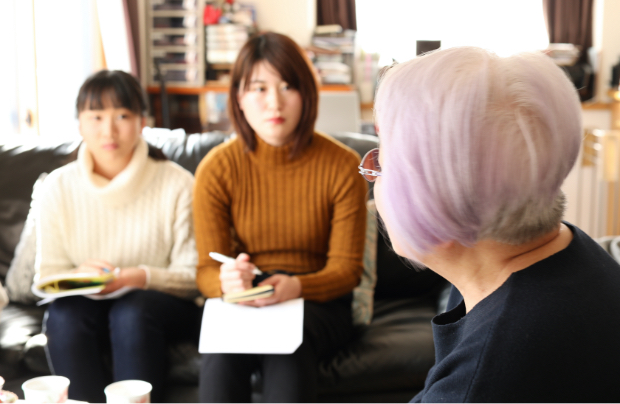HIROSHIMA memory keepers Pass down a story
Vol. 15 2019.7.16 up
Treat others, yourself and things with love and care. If you are considerate, you’ll have no discrimination in your mind. Friends on your side are your treasures.
Lee Jongkeun
A-bomb survivor
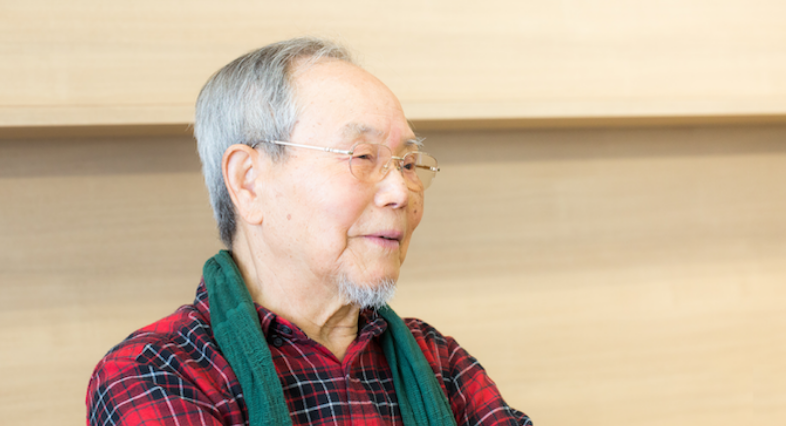
What do people handing down their experiences of the A-bombing think and try to convey?
Lee Jongkeun, 91, a second-generation Korean living in Japan and an A-bomb survivor, revealed his Korean name when he participated in a Peace Boat voyage and started to talk about his experience of the A-bombing.
We asked him about his experience of discrimination which started in his childhood in his life and the day of August 6.
Section
About Mr. Lee himself
What do you want to convey in particular by talking about your experience of the A-bombing
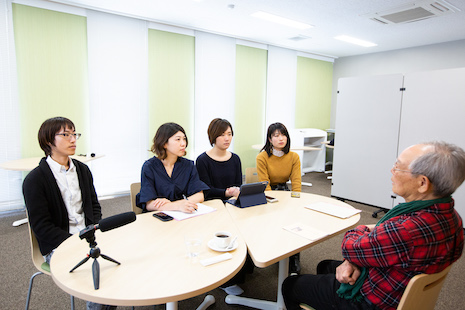
I experienced August 6 as a second-generation Korean living in Japan.
I want to convey the fact that A-bomb victims are not only Japanese but also foreigners such as Koreans, Americans, Australians, Chinese and Filipinos.
At the same time, I want to convey my experience of discrimination as a Korean, called Chosen-jin, though I was born and raised in Japan.
I want to convey to the next generation how we suffered from discrimination and how cruel that discrimination was.
How old are you now?

90 years old. I’ll be 91 in August, 2019.
Please tell me about your family members.

There were 11 family members, and I was the first son of nine children.
I had my parents, an older sister, a younger sister and six younger brothers.
To Japan from Korea. Discrimination at primary school
Why did your family come to Japan from Korea?
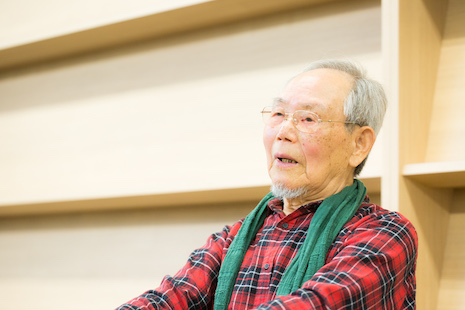
In 1910, Japan annexed Korea. My parents lived in the country. They said that Japanese who came to Korea as policemen often took chickens and food without permission.
As Korea was under Japanese control, they couldn’t complain, and such looting continued.
Thinking they couldn’t live there anymore, they decided to go to Japan. At that time, Koreans didn’t need passports to enter Japan.
In 1920, they settled in Hikimi (present Masuda City), deep in the mountains, and started making charcoal for a living, which the Japanese taught them how to do. I was born there in 1928.
Are there still Korean villages around Hikimi?

Not anymore. I heard that when my parents moved there, about 2000 Koreans lived there.
After the work settled down, we moved to Yoshiwa in Saeki-gun, Hiroshima Prefecture.
My father bought a mountain and started making charcoal again.
Then I went to primary school, helping my father’s work.
Till second grade, I went to a branch school near my house, and I walked to the main school 4km away after I became a third grader.
Did you use your Korean name when you went to school?

No. My real name is Lee Jongkuen but I used Egawa Masaichi which my parents named me in Japan.
Didn’t you feel strange about that?

Not so much.
I rather tried to forget my Korean name anyhow.
Why did you want to forget your Korean name?

Because of discrimination.
The village had only about 400 households.
So, a rumor that we were Korean spread quickly among villagers, because my parents couldn’t speak Japanese fluently. We couldn’t rent an ordinary house.
We lived in a house which stood in a lower place where the water of the paddy fields flooded after heavy rain.
Did you have any discrimination at school?
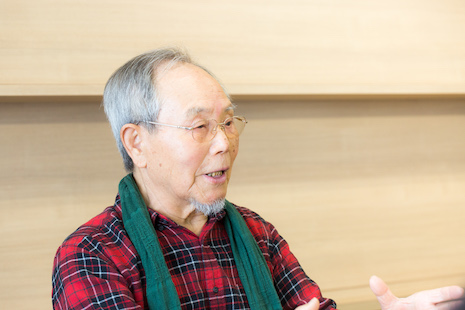
Yes, many times.
I clearly remember once when I was a fourth grader.
One girl was crying and a teacher asked who made her cry. Then, some children said that I did.
I had done nothing. However, the teacher took me out to the corridor and hit me.
I was hit so many times in those days.
When I was a sixth grader, a terrible thing happened.
A middle aged man in the village said, “Egawa, come here and stand there.” I was made to stand at the side of the path, and the man urinated on me.
I just cried and couldn’t say anything, though I didn’t understand why the man urinated on me.
At home, I told my father what happened, but he said nothing and didn’t protest to the man.
The situation of Koreans was very weak at that time. Because my younger sister and brothers also got such harassment, my parents decided to leave Yoshiwa.
To Kure from Yoshiwa
Where did you move to from Yoshiwa?

We moved to Yokohama in Saka-cho, Kure City.
It was the time when Mitsubishi Shipbuilding Company was starting, and my parents started a Korean worker dispatching service.
They made workers live in a hut called hanba, taking care of the workers.
I went to higher primary school in Saka-cho and never had discrimination there.
Why didn’t you have any discrimination there?

Because our house and hanba were in the mountains and my parents hardly went to the town where the school was located, my classmates didn’t know I was Korean.
I studied really hard and had a wonderful time at school for two years.
When I was 14 years old, I luckily passed the employment application of the former Japanese National Railway.
It was my dream job. As I studied hard, I was very happy when receiving an acceptance letter from the principal.
Then, around that time, my family moved to from Kure to Hera in Hatsukaichi.
It was rewarding that you studied hard and got a job.
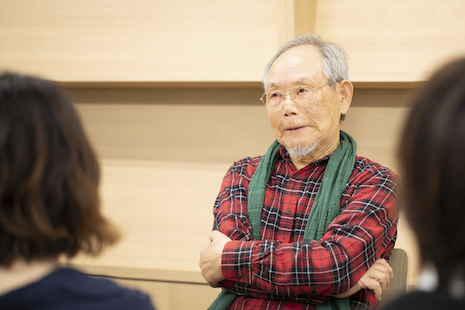
Yes, but soon my feeling changed.
When I submitted the acceptance letter to JNR, I happened to see in the remarks column where the principal had written that I am a Korean.
He wanted to give notice of my nationality to JNR.
Wondering why he did that and feeling depressed, I erased the entry.
So, I was working at JNR from 14 until about 18 as a Japanese.
The day of August 6
How old were you when A-bomb was dropped?

I was 16 years old working at JNR.
My working place, Engine Depot #1, was a few minutes’ walk from Hiroshima Station, near the present Mazda Zoom-Zoom Stadium.
That area was the steam locomotive yard called Engine Depot #1 at that time.
I was living in the dormitory near the Depot for a while.
However, I returned home when I was 16, because the food served there every day was so bad.
On August 6, I was on the train heading to work from Hera in Hatsukaichi where my house was located.
Did your family move to Hatsukaichi from Kure before the A-bombing?

Yes. we moved to Hera Village in Hatsukaichi when I was 14.
What kind of food was served in the dormitory?

Miso soup, pickled radish and rice mixed with sorgum seeds from Manchuria and smashed soybean curd refuse. Those soybeans were grown by the Kanto Volunteer Army.
They were very bad.
You said you were on the train. Will you tell us your experience on August 6?
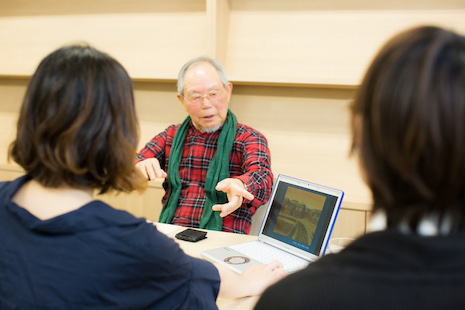
I usually took the train departing from Hatsukaichi Station around 7 o’clock. However, I had a small quarrel with my mother that morning.
I didn’t want to put on my usual black trousers and asked my mother to give me my white trousers. She said that I should put on black trousers to work as usual and refused to give me my white trousers.
So, I missed the train which I always took.
Now there is a straight line from Miyajima to Hiroshima Station, but at that time, I had to change trains at Koi Station to get to Hiroshima Station.
I changed trains and passed by the hypocenter ten minutes before the A-bomb was dropped.
The moment I crossed over the Kojin-bridge after getting off the streetcar, a yellow-orange colored flash spread all around.
The whole town shined, and the flash that had hit the wall of a house in front me looked waving.
I thought something extraordinary must have occurred. The whole town was orange. Seeing the flash, I lay down quickly, covering my eyes, ears and nose with my hands.
When I looked up after a while, I could see nothing because it was completely dark. The houses around me had all collapsed. My lunch box was blown 30 meters away.
Dashing to my work place, I heard voices calling, “Help me!” from the collapsed houses. However, I couldn’t help anyone.
I just wanted to reach my work place. When I reached there, my colleagues were safe with no burn injuries, having been in the depot at the moment of the explosion.
Was the depot strong?

Yes. Because trains came and went, the depot had no doors like a tunnel. And because the walls were thick and the blast went through, it didn’t collapse.
Seeing my red face swollen by burning, my friend kindly put steam locomotive’s oil on it.
At that time, people believed that oil was good for burn injuries.
However, it was so painful that I rejected him by force, saying “Stop it!”
Then I stayed for a while with my colleagues in the air-raid shelter nearby.
What were you doing in the shelter?

Just lying.
Feeling hungry, I ate the rice from my lunchbox which had blown away.
I wonder now how I dared to eat it, because it was contaminated by radiation.
We had no information about radiation or its risk.
Contamination is invisible, right?
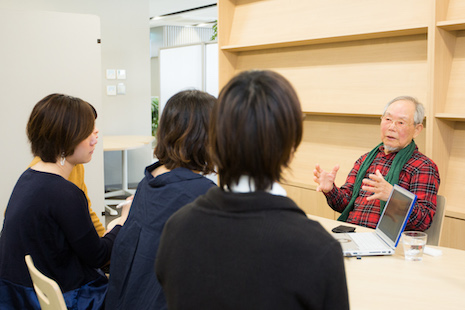
Yes, we didn’t know about the A-bomb in the first place or radiation.
As I was hungry, I ate about the half of the lunch.
After that, I kept crying for a long time, thinking that my parents, sisters and brothers might be suffering like me.
Then, I noticed my work cap had blown away.
Around 2 o’clock I went out of the shelter to look for it.
On the way to the East Military Drill Grounds where soldiers had been training, I saw many hideously burned people.
They swarmed and entered the grounds one after another. Because it was summer, people were all wearing half sleeves.
Imagine the blast and 3000 degrees Celsius heat rays. Iron melts at 1500 degrees Celsius. I was exposed at 1.8km from the hypocenter.
Hideously burned people seemed to have been exposed at closer places than me. Almost all the people who were within 500m from the hypocenter died.
People’s clothes were stripped off by the blast.
They were half-naked and their skin hung down. Many people said, “Give me some water!”
I saw many dying people and dead bodies.
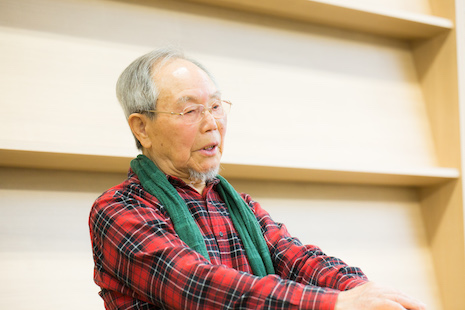
Because I couldn’t find my cap, I returned to the depot.
There was no work, so we left the depot around 4 o’clock to go home.
Because we couldn’t walk near the hypocenter area, we had to find an unburned area to go through.
I took a long way round to go home in Hatsukaichi.
We walked in a zigzag to find unburned areas or areas where fire had gone down.
In Senda-machi where Hiroshima University was located, a horse was dead under a collapsed wall of a university building, and its eyeballs were popping. Being surprised we dashed past that place.
The blast made the horses’ eyeballs pop?
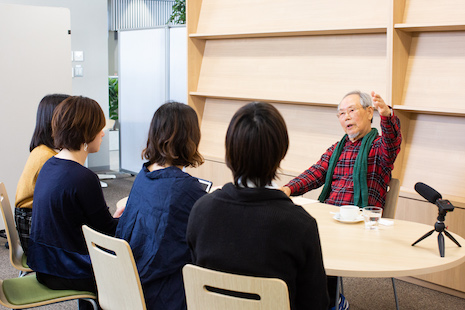
Yes, I think the A-bomb blast caused that.
When we passed the foot of a bridge, people burned black stared at us with dusty heads.
They cried, “Water! Please!” “Help!” I thought it was a hell.
Many corpses were flowing in the rivers and there were still places burning in the town.
Walking through such areas, we reached National Route 2.
It was still 16 km away from my house, and it was really hard for 16-year old boy with burn injuries to walk 16 km.
Returned home and treatment of keloids
How long did it take to walk home with your burn injuries?

I left the depot at around 4:00 in the afternoon and arrived home after 11:00 in the evening.
So, I walked for seven or eight hours. When I saw a military truck loaded with a pile of dead bodies, I raised my hand and asked to let me ride on it.
However, they refused, so I had to walk all the way to Hera.
Arriving home, I found only my brother. I asked him where my parents were, and he said that they went to Hiroshima to find me.
Though I had told my father I was working at a depot in Hiroshima Station, I hadn’t told him in detail.
Also, I was worried that if my parents came to the depot, my colleagues would know that I was Korean.
They went to Hiroshima to look for you, though they didn’t know the specific work place.

Exactly.My father walked to near Hiroshima Station.
Because he couldn’t find me, he returned home the following evening.
My mother returned home from Itsukaichi Station.
She saw many burned people walking, holding their hands out in front of them, so she thought there was no chance of her son surviving.
But, seeing me at home, she was happily surprised and cried out, “You are alive!” and held me, though I was stained with black oil.
Your mother must have felt sorry that you had to walk back home with burn injuries.
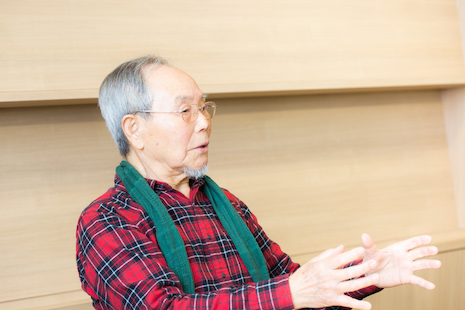
I guess so. Though I tried to sleep that night, my injuries were too painful to sleep.
The next day, I went to the JNR Hospital near my house.
Because there was no medicine, they could only put some mercurochrome on my burn injuries.
Those injuries became scabs, and then I picked them, putting mercurochrome on again and again.
As I couldn’t see behind my neck, my mother put it on there.
After a while, the wounds began to rot and were covered with flies and infested with maggots.
That caused an unbearable smell.
My face was swollen. There was nothing I could do about that.
My mother must have suffered, seeing her first son in such a bad condition.
Saying “Chugora,” which means, “I hope you will die soon,” she held me and kept crying.
I also cried. I can still remember my mother’s tears dripping on my face.
At that time, we heard if we lost our hair, we would die. So, I pulled my hair every morning but my hair didn’t fall out. Then, I felt relieved that I wouldn’t die.
Do you still have burn scars now?

Luckily, I hardly have any now.
Seeing that my burn injuries didn’t get better, an old Japanese couple who lived near my house brought some oil in a cup.
That vegetable oil saved me. In two months, my skin got better and healthy.
Around November or December, I could go out and returned to my old place of work.
Postwar Hiroshima - till I began to tell my A-bomb experience
I think you have observed postwar Hiroshima. How did you spend your life after returning to work?

I had to submit my family register to JNR.
Before then, I thought if they knew I was Korean, I would be fired, so I hadn’t submitted it.
Because it was my dream job, I wanted to stay there as long as possible.
However, wondering when they would ask me to submit it next, I was too scared to continue working.
When I was 18, I suddenly quit JNR neither handing in my resignation letter, nor getting the last month’s salary.
After you quit JNR, how did you make a living?

I got a driver’s license and worked as a truck driver.
I couldn’t work at Japanese companies, as I didn’t have an ID card.
I did other work with my family, such as making candies and liquor and raising pigs to sell.
I didn’t have fixed work for a while, but when I was 30, I owned a shop for the first time. The name was Ahiruya, a recycle shop.
From then on, I started having a steady life.
When did you start telling your A-bomb experience?

At first, I hated hearing the words “A-bomb testimonies.” I hated to tell my A-bomb experience.
The first opportunity to tell my experience was the Peace Boat voyage in 2012.
I wrote about my experience on manuscript paper using my Korean name and told it to the children of a large Greek school.
What was it like telling your A-bomb experience for the first time?

I think my voice was too soft.
After I returned to Japan, a man who saw my article in the newspaper contacted me.
He was the director of the Korean A-bomb survivors support group.
He asked me to tell my experience again, and I started telling it in Japan from 2012.
What do you want to convey when you tell your experience to elementary school children?
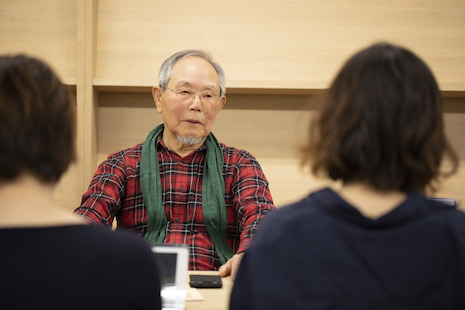
I often say, “Treat others, yourself and things with love and care. If you are considerate, you will have no discrimination in your mind. Friends on your side are your treasures. Your great-grandparents all experienced the war. In the past, Japanese people went abroad and killed many people. Millions of Japanese people were also killed. You are not responsible for that. However, you will be responsible for becoming good fathers and mothers who never make war again.”
I also tell them that the opposite of peace is indifference.
When I talk about discrimination, I add the story about Auschwitz to my painful story.
Showing a picture that Jews were transported to concentration camps in a train car, I said, “About 70 people were carried in this car for about four days without a toilet. Almost all of them were killed only because they were Jews. Being a Jew was the only reason. What is the equality of life? Can people kill people indiscriminately?”
Thank you for today.
We should think deeply how to hand down this peaceful society to the next generation, not only to feel that we are lucky because we live in peace now.

Yes, it’s very important.
Please hand down my experience to the next generation.
There is a proverb, “Listeners today, tellers tomorrow.”
Interviewed on June 2019.
About
"Interviews with HIROSHIMA memory keepers" is a part of project that Hiroshima「」– 3rd Generation Exhibition: Succeeding to History
We have recorded interviews with A-bomb survivors, A-bomb Legacy Successors, and peace volunteers since 2015.
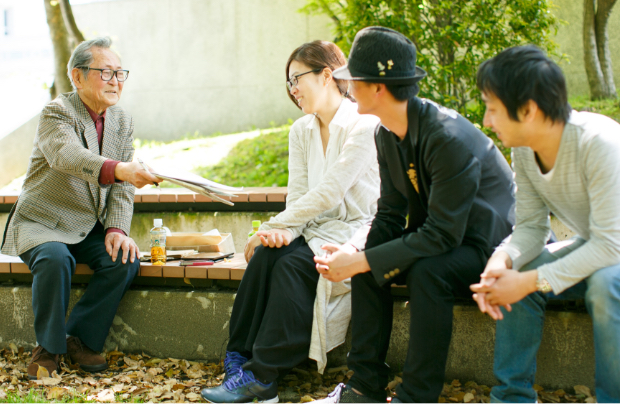
What are Hiroshima memory keepers feeling now, and what are they trying to pass on?
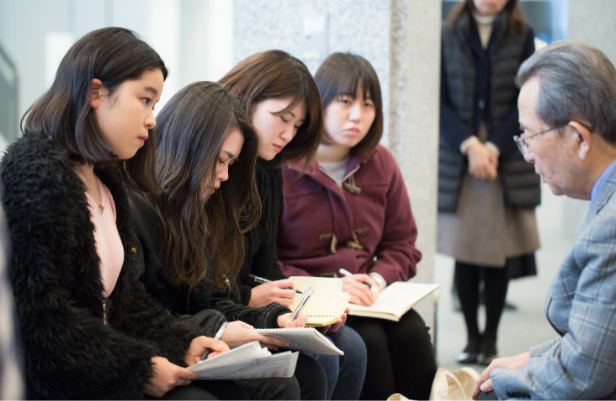
What can we learn from the bombing of Hiroshima? What messages can we convey to the next generation? Please share your ideas.
